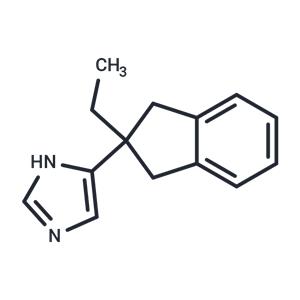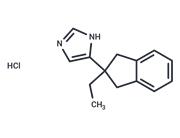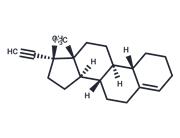| Name | Atipamezole |
| Description | Atipamezole (Antisedan) is a synthetic α2 adrenergic receptor antagonist. It has also been researched in humans as a potential anti-Parkinsonian drug. |
| In vitro | The affinity of atipamezole for α2-adrenoceptors and its α2/α1 selectivity ratio are considerably higher than yohimbine. Atipamezole is not selective for subtypes of α2-adrenoceptors. It has negligible affinity for 5-HT1, 5-HT2 and I2 bindings sites[1]. |
| In vivo | Atipamezole is well-tolerated in rodents and exhibits modest cardiovascular effects (0.01–1 mg/kg, i.v.) in anesthetized, normotensive rats. It is frequently used by veterinarians to reverse sedation or anesthesia in animals. Atipamezole enhances sexual activity in rats and monkeys and increases pain-related responses in animals with sustained nociception by blocking noradrenergic feedback inhibition of pain. At low doses, it improves alertness, selective attention, planning, learning, and recall in experimental animals, although not necessarily affecting short-term working memory[1]. |
| Storage | Powder: -20°C for 3 years | In solvent: -80°C for 1 year | Shipping with blue ice. |
| Solubility Information | DMSO : 39 mg/mL (183.7 mM)
Ethanol : 39 mg/mL (183.7 mM)
H2O : < 1 mg/mL (insoluble or slightly soluble)
|
| Keywords | Adrenergic Receptor | Beta Receptor | MPV1248 | MPV-1248 | Inhibitor | inhibit | Atipamezole |
| Inhibitors Related | Olanzapine | Mirtazapine | Octopamine hydrochloride | Gemfibrozil | Dexmedetomidine hydrochloride | Phenylephrine hydrochloride | Isoprenaline hydrochloride | Amitriptyline hydrochloride | Trazodone hydrochloride | Mianserin hydrochloride |
| Related Compound Libraries | Bioactive Compound Library | Anti-Neurodegenerative Disease Compound Library | Membrane Protein-targeted Compound Library | Anti-Cancer Clinical Compound Library | Drug Repurposing Compound Library | Inhibitor Library | Bioactive Compounds Library Max | GPCR Compound Library | Human Metabolite Library | Anti-Cancer Drug Library |

 United States
United States



